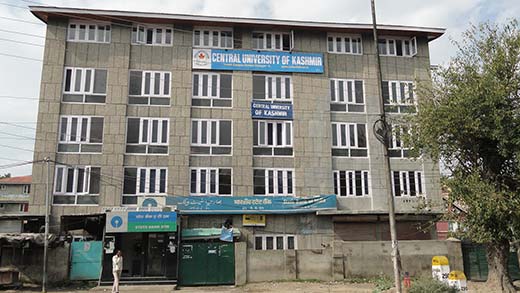Bilal Handoo
SRINAGAR
The book supply lines that feed libraries of educational institutes across Kashmir aren’t always devoid of dubious deals. At least, this is what many local book suppliers are alleging. There are favours based on benefits involved, they say. Plus, a growing cry among them is: A greater leeway is being given to non-locals on pretext of high “turnout”—the condition local book suppliers never meet owing to their ‘modest’ trade.
At centre of controversy is Central University of Kashmir (CuK). Lately, the institute has trended for not-so-good-reasons. Besides facing allegation of “politicisation of education”, the institute has become a ‘talk of town’ for fast turning out to be a ‘second stint’ institute for former Kashmir University staff—who, supposedly, call the shots in CuK at the moment.
One among them is Reyaz Rufai—the erstwhile Chief Librarian of Kashmir University. He is currently serving CuK’s Chief Librarian.
“Rufai is taking local book suppliers for a ride,” complained one local book supplier. “He gives preference to non-locals. Locals are being turned down by saying: ‘You don’t meet the precondition.’ ”
The precondition, he said, is based on annual turnover. “It is true that we don’t match non-local counterparts in terms of turnover as we face slump in trade due to departmental hurdles, lukewarm sales and larger state of affairs of valley,” the book supplier said.
Amid all this, the disgruntled book suppliers alleged: Rufai has struck a deal with a New Delhi based book supplier. The step, they said, has closed doors for the local suppliers.
“Well, yes, I agree that most of our supply lines come from Delhi,” Rufai told Kashmir Life. “But let me clarify,” he stressed, “there are no shady dealings involved. We formally invite suppliers by publishing tenders.” But yes, he said, there exists a precondition based on a turnover. “As locals fail to meet the criteria, therefore non-locals end up availing the supply orders. As such, we make no secret about our dealings.”
But Rufai’s counterpart, Chief Librarian of Central University of Jammu (CuJ), Prof NR Sharma said there exists no such precondition at CuJ. “See, we mainly prefer the supply line from the members of the Federation of Publishers’ and Booksellers’ Associations in India (FPBAI),” Prof Sharma told Kashmir Life.
FPBAI is the largest representative body of the Indian Book Industry with membership of around 4,000 all over India. Formed in January 1953 at New Delhi, FPBAI takes up with concerned authorities the matters of common interest pertaining to the book trade like paper prices, tax provisions, import and export regulations, copyright laws, nationalization of text books, anti-piracy measures, etc.
“Though we have clear guidelines in place, but yes, we do give supply orders to local suppliers as well,” Prof Sharma said.
Even FPBAI favours local book suppliers by turning down any precondition. “Though mainly the members of FPBAI supply books to school, college and university libraries across India,” P Satyanarayana, President FPBAI told Kashmir Life, “but it doesn’t mean locals can’t supply books to government or semi-government institutes.”
In fact, Satyanarayana said, locals across all states should supply books without facing any precondition from institutes. “Even FPBAI endorses that step,” he said.
Back in valley, chief librarian IUST Prof Wajih A Alvi, also talks on similar lines.
He said local book suppliers are given preference at IUST for procuring annual book supply orders—that too, without any precondition. “Look, the fact is: most of the locals are being taken onboard for the supply orders,” Prof Alvi said. “But yes, we also order the supply from non-locals, especially from Delhi, only if locals fail to deliver the stock.”
A lady working at SKAUST Kashmir’s Library Department echoed Prof’s Alvi’s words. “Our doors aren’t shut for the local suppliers,” she said, declined to be named. “We have a proper and formal system in place. We receive requisition for the supply orders from various departments. And then we put it in front of advisory committee that finally invites local suppliers to meet the demand.” And yes, she said, there exists no precondition based on turnover.
After inviting bad press many times since its inception, CuK’s fresh controversy is likely to dent its image further, if the issue remains unaddressed before snowballing into a major crisis.
